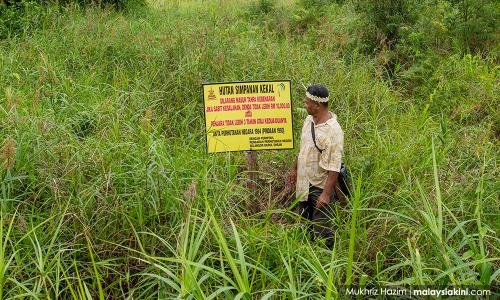LETTER | Will banks finance development on Kuala Langat forest reserve?
LETTER | The degazetted Kuala Langat North Forest Reserve (KLNFR) is to make way for that one ubiquitous commodity - property development.
Considering that the Selangor government has announced that the degazetted portion of the KLNFR will be developed by Gabungan Indah Sdn Bhd (GISB), whose ultimate shareholder is the Parkcity Group (PCG), the developer of the acclaimed township of Desa Park City in KL, would the banks, alone or collectively, pursue lending opportunities with GISB and or PCG in financing the mixed-used development?
PCG has established itself in the development of the township of Desa Park City and it is presumed that it has the redevelopment expertise, good credit history and finances adequate to support the project in the event of a problem.
The Global Environment Centre (GEC), who is working on a collaborative with the Selangor Forestry Department to rehabilitate more than 1,000ha of degraded forest within and adjacent to the Raja Musa Forest Reserve says the KLNFR is a valuable “carbon sink” — naturally storing more than 1.5 million tonnes of carbon from the atmosphere.
Even though Malaysia contributes less than 0.7 percent of total global emissions, the country is a significant carbon sink and one of only 17 countries in the world with mega-biodiversity.
Malaysia's biennial update reports to the UN Framework Convention on Climate Change (UNFCCC) confirm the importance of these natural carbon sinks and forest gazetting ie permanently listing forested areas as conservation areas, accounts for the vast majority, almost 75 percent, of the reported reductions.
Malaysia’s Nationally Determined Contributions (NDCs) to reduce carbon emissions is to achieve a 45 percent improvement in greenhouse gas emission intensity per unit GDP by 2030, compared with 2005 levels.
As at 2014, Malaysia’s carbon intensity had improved by 33 percent compared with 2005 levels, although after netting off emissions from land use, land use change and forestry, the figure stood closer to 27 percent.
With only nine years left to achieve our 2030 target, Malaysia must pick up speed and accelerate progress across all actors and stakeholders, if we are to meet our NDC targets.
The climate emergency requires catalysing action and it is not a one-country problem. The country requires commitment and collective action from everyone, individuals, private and the public sector, to achieve carbon neutrality.
The climate crisis is a risk which needs to be addressed as part of the governance and stewardship duties of CEOs and boards of directors of every organisation including banks, in the same way as any other issues prioritised at the board level.
Malaysian banks had in 2019, took up Bank Negara Malaysia’s challenge to combat climate change with the adoption of a responsible lending policy as well as educating their retail and business banking customers on sustainability.
Maybank, the number one bank in Malaysia established a responsible lending guideline in 2015 to manage environmental, social and governance (ESG) risks, which was later expanded into a more comprehensive ESG risk management framework and subsequently endorsed as a company policy in 2018 that has now been integrated into the bank's day-to-day decisions in relation to financing practices.
CIMB, the 2nd largest bank joined a coalition of 130 global banks with a combined asset of over US$47 trillion to commit to aligning their business with the Sustainable Development Goals (SDG) and the Paris Agreement on Climate Change.
It also instituted its Group Sustainable Financing Policy (GSFP) in 2019 and core to the implementation of the GSFP is enhanced due diligence where they collect information on environmental and social risk factors linked to the borrower’s operations and engage with the company on any issues they may find.
Any decision by any of the banks in Malaysia to participate in the future development of the degazetted portion of the KLNFR calls into question the banks’ sustainability aspirations and commitments if they, in their materiality assessments, dismissed the concerns of the local communities, who bear the brunt of the impacted land use and environment.
In addition to social effects, one of the most consequential effects of the degazettement of the KLNFR is increased forest edge and decreased core area. Generally speaking, this can lead to changes in forest composition, which can affect the biodiversity, stability, and complexity of the forest ecosystem.
Increasingly, financial institutions are being brought into the spotlight for their role in financing deforestation. Malaysian banks are no exception.
Consistently called out for their deliberately narrow vision in disregarding the breadth of issues stemming from forest risk sectors which, aside from deforestation and its climate effects, include peat development, land rights violations, labour abuses and corruption, banks in Malaysia have been categorised as the worst performers on ESG risk assessment and mitigation.
The governor of Bank Negara Malaysia has called the climate crisis “an existential threat” because it poses systemic risks to the financial system.
This spurred the formation of the Joint Committee on Climate Change comprising of 12 financial institutions in 2019 as a multi-regulator platform to pursue collaborative actions for building climate resilience within the financial sector.
It is the duty of banks to do the right thing and they have a definite role to play and responsibility to fulfil and follow internationally set standards in requiring that every borrower submit proofs in their applications of their public commitments towards no deforestation, peatland and exploitation policies in all development areas at group level and across their supply chains, investments and partnerships.
Failure to comply ought to prompt an immediate exclusion and definancing.
The views expressed here are those of the author/contributor and do not necessarily represent the views of Malaysiakini.
RM12.50 / month
- Unlimited access to award-winning journalism
- Comment and share your opinions on all our articles
- Gift interesting stories to your friends
- Tax deductable
